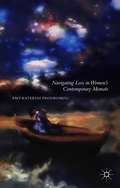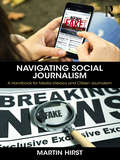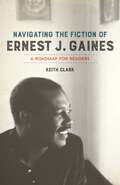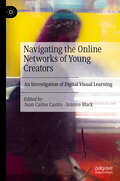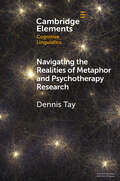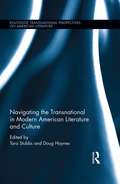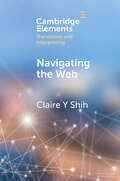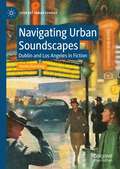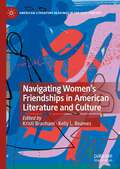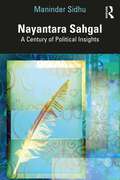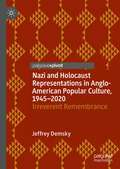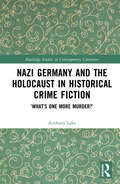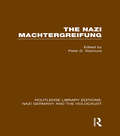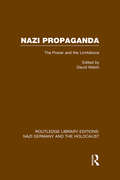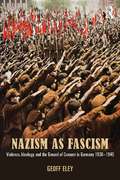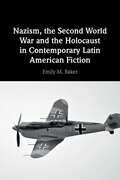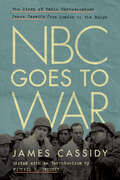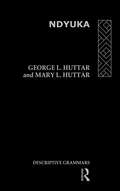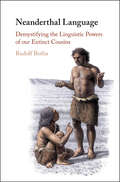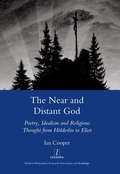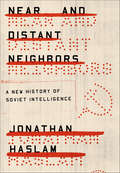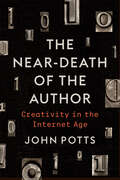- Table View
- List View
Navigating Loss in Women’s Contemporary Memoir
by Amy-Katerini ProdromouNavigating Loss in Women's Contemporary Memoir illustrates key experiences taken from a new subgenre of 'the grief memoir' that takes a fresh look at the way we deal with loss. Through the lens of 'new wave' theories of grief, it looks at how 'memoirs of textured recovery' contribute to new understandings of loss as complex, nuanced, and ambiguous. In asking timely questions at the forefront of contemporary issues surrounding life writing, healing, and recovery, it contributes to ongoing conversations about mourning and sheds light on how we navigate loss. Drawing from life writing narratives written by some of the best contemporary memoirists of our age, Navigating Loss allows readers to connect with women whose real-life stories of loss form in themselves a kind of 'weeping constellation' (Gail Jones) or community of mourners.
Navigating Social Journalism: A Handbook for Media Literacy and Citizen Journalism
by Martin HirstPublic trust in the once powerful institutions of the News Establishment is declining. Sharing, curating and producing news via social media channels may offer an alternative, if the difficult process of verification can be mastered by social journalists operating outside of the newsroom. Navigating Social Journalism examines the importance of digital media literacy and how we should all be students of the media. Author Martin Hirst emphasizes the responsibility that individuals should take when consuming the massive amounts of media we encounter on a daily basis. This includes information we gather from online media, streaming, podcasts, social media and other formats. The tools found here will help students critically evaluate any incoming media and, in turn, produce their own media with their own message. This book aims both to help readers understand the current state of news media through theory and provide practical techniques and skills to partake in constructive social journalism.
Navigating the Fiction of Ernest J. Gaines: A Roadmap for Readers
by Professor Keith ClarkOne of the South’s most revered writers, Ernest J. Gaines attracts both popular and academic audiences. Gaines’s unique literary style, depiction of the African American experience, and celebration of the rural South’s oral tradition have brought him critical praise and numerous accolades, including a MacArthur Fellowship, a National Humanities Medal, and a National Book Critics Circle Award for his novel A Lesson before Dying. In this welcome guide to Gaines’s fiction, Keith Clark offers insightful analyses of his novels and short stories. Clark’s close readings elucidate Gaines’s more acclaimed works—including The Autobiography of Miss Jane Pittman and A Gathering of Old Men—while also introducing lesser-known but masterfully crafted pieces, such as the story “Three Men” and the civil rights novel In My Father’s House. Gaines’s most recent work, The Tragedy of Brady Sims, receives here one of its first critical examinations. Clark shows how the themes of Gaines’s literary oeuvre, produced over the past fifty years, dovetail with issues reverberating in twenty-first-century America: race and the criminal justice system; black masculinity; the environment; the enduring impact of slavery; black southern women’s voices; and blacks’ and whites’ interpretation of history. In addition to textual discussions, the book includes an interview Clark conducted with Gaines at the writer’s home in New Roads, Louisiana, in 2014, further illuminating the inner workings and personality of this eminent literary artist.
Navigating the Online Networks of Young Creators: An Investigation of Digital Visual Learning
by Juan Carlos Castro Joanna BlackThis volume examines how young creators learn, create, and share their visual art online. Drawing from a robust set of case studies gathered locally, nationally, and internationally over three years with young adults 16-24, this work comes together as a crucial resource for understanding the evolving landscape of online art creation and dissemination by young people. The influence of social media is central to this exploration of the continuous cycle of producing, circulating, and consuming of digital images, here designated as digital visual learning networks (DVLN). As technology remains an inherent part of daily activities, contributions provide insights into how young creators harness tools to learn, innovate, and share.
Navigating the Realities of Metaphor and Psychotherapy Research (Elements in Cognitive Linguistics)
by Dennis TayThe 'real-world' commitment of cognitive linguistics is demonstrated by increasingly extensive collaboration between researchers and industry partners. Yet, there has been little critical reflection on the lessons learnt from these collaborative efforts. Beginning researchers may benefit from in-depth discussion of how various practical realities inform, constrain, or otherwise shape important methodological and/or analytic decisions. This Element reflects on long-term collaborative work between a metaphor researcher and psychotherapists, offering practical advice on navigating the latent realities of this type of research. The three foundational components of psychotherapy – the therapist, the client, and the interactional setting itself – are discussed in turn, covering issues like ethically engaging therapists in research design and data analysis, dealing with underexplored variabilities in client responses, and managing the inherent tension between spontaneity and control in an interactional setting like psychotherapy. Some thoughts on how the lessons are transferable to other research contexts are offered.
Navigating the Transnational in Modern American Literature and Culture: Axes of Influence (Routledge Transnational Perspectives on American Literature)
by Tara Stubbs Doug HaynesThis study develops the important work carried out on American literature through the frameworks of transnational, transatlantic, and trans-local studies to ask what happens when these same aspects become intrinsic to the critical narrative. Much cultural criticism since the 1990s has sought to displace perceptions of American exceptionalism with broader notions of Atlanticism, transnationalism, world-system, and trans-localism as each has redefined the US and the world more generally. This collection shows how the remapping of America in terms of global networks, and as a set of particular localities, or even glocalities, now plays out in Americanist scholarship, reflecting on the critical consequences of the spatial turn in American literary and cultural studies. Spanning twentieth and twenty-first century American poetry, fiction, memoir, visual art, publishing, and television, and locating the US in Caribbean, African, Asian, European, and other contexts, this volume argues for a re-modelling of American-ness with the transnational as part of its innate rhetoric. It includes discussions of travel, migration, disease, media, globalization, and countless other examples of inflowing. Essays focus on subjects tracing the contemporary contours of the transnational, such as the role of the US in the rise of the global novel, the impact of Caribbean history on American thought (and vice versa), transatlantic cultural and philosophical genealogies and correspondences, and the exchanges between the poetics of American space and those of other world spaces. Asking questions about the way the American eye has traversed and consumed the objects and cultures of the world, but how that world is resistant, this volume will make an important contribution to American and Transatlantic literary studies.
Navigating the Web: A Qualitative Eye Tracking–Based Study of Translators' Web Search Behaviour (Elements in Translation and Interpreting)
by Claire Y. ShihThis Element reports an investigation of translators' use of web-based resources and search engines. The study adopted a qualitative eye tracking-based methodology utilising a combination of gaze replay and retrospective think aloud (RTA) to elicit data. The main contribution of this Element lies in presenting not only an alternative eye tracking methodology for investigating translators' web search behaviour but also a systematic approach to gauging the reasoning behind translators' highly complex and context-dependent interaction with search engines and the Web.
Navigating Urban Soundscapes: Dublin and Los Angeles in Fiction (Literary Urban Studies)
by Annika EisenbergNavigating Urban Soundscapes: Dublin and Los Angeles in Fiction offers an innovative analytical framework to explore sound in different media and across two distinct urban soundscapes. Studying a wide range of novels, films, and radio dramas, using Dublin and Los Angeles as case studies, Annika Eisenberg asks how sounds are aestheticised to signify urban space in fiction, and how sounds allow such fictional urban spaces to be navigated, both by auscultators, the characters listening within a work of fiction, and by auditeurs, the implied audience of a fictional work. Eisenberg argues that the concept of “urban sound” is a cultural and aesthetic construct, and in doing so, she shows why aesthetics needs to be front and center in sound studies.
Navigating Women’s Friendships in American Literature and Culture (American Literature Readings in the 21st Century)
by Kristi Branham Kelly L. ReamesThis volume presents a collection of critical essays that center women’s friendship in women’s literary and artistic production. Analyzing cultural portrayals of women’s friendships in fiction, letters, and film, these essays collectively suggest new models of literary interpretation that do not prioritize heterosexual romance. Instead, this book represents friendships as mature and meaningful relationships that contribute to identity formation and political coalition. Both the supportive and competitive aspects of friendships are shown to be crucial to women’s identities as individuals, political citizens, and artists. Addressing the complexities of how 20th- and 21st-century cultural texts construe women’s friendships as they navigate patriarchal institutions, this collection advances scholarship on friendship beyond men and masculine models.
Nayantara Sahgal: A Century of Political Insights
by Maninder SidhuThis book is a comprehensive critical re-reading of Nayantara Sahgal’s oeuvre. One of the most significant Indian English writers, her fictional and non-fictional engagement with historical events and political dilemmas inextricably links her to the colonial, anti-colonial and post-colonial discourse in India. Drawing transcontinental connections with the ideas of Fanon, Foucault, Said, Beauvoir, White, Beck and Habermas the monograph juxtaposes recurring themes in her writing with the ideas of significant Indian post-colonial commentators. Tracing the subliminal tendencies in her writing to Gandhian humanity and Nehruvian pragmaticism, the book moves beyond clichés of feminist criticism and genealogical ties to unveil a unique artist who has folded nearly a century of Indian experience in her work. Drawing on novels, essays, speeches, journalism and interviews by Nayantara Sahgal, this volume will be of great interest to scholars of South Asian literature, post-colonialism, politics and contemporary history/culture/change.
Nazi and Holocaust Representations in Anglo-American Popular Culture, 1945–2020: Irreverent Remembrance (Palgrave Studies in Cultural Heritage and Conflict)
by Jeffrey DemskyThis book analyzes sensationalized Nazi and Holocaust representations in Anglo-American cultural and political discourses. Recognizing that this history is increasingly removed from contemporary life, it explains how irreverent representations can help rejuvenate the story for successive generations of new learners. Surveying seventy-five-years of transatlantic activities, the work erects counterposing categorizes of “constructive and destructive memorializing,” providing scholars with a new framework for elucidating both this history and its historicization.
Nazi Germany and the Holocaust in Historical Crime Fiction: ‘What’s One More Murder?’ (Routledge Studies in Contemporary Literature)
by Anthony LakeThis is the first book- length academic study of the portrayal in contemporary historical crime fiction of Nazi Germany and the Holocaust and their legacies. It discusses novels written by five authors: David Downing, Philip Kerr, Luke McCallin, Joseph Kanon and David Thomas. Their work belongs to a subgenre of the historical crime novel that has emerged since the late 1980s to become a significant body of writing located at the intersection of crime fiction and Holocaust literature. The readings of these novels explore questions of form and genre to ask how popular fiction might approach the Holocaust. Themes of resistance and complicity and the relationship between them, and problems of guilt and responsibility are also discussed. This book also explores questions of justice to show how these novels explore social and moral justice, and vengeance
Nazi Germany and the Holocaust in Historical Crime Fiction: ‘What’s One More Murder?’ (Routledge Studies in Contemporary Literature)
by Anthony LakeThis is the first book- length academic study of the portrayal in contemporary historical crime fiction of Nazi Germany and the Holocaust and their legacies. It discusses novels written by five authors: David Downing, Philip Kerr, Luke McCallin, Joseph Kanon and David Thomas. Their work belongs to a subgenre of the historical crime novel that has emerged since the late 1980s to become a significant body of writing located at the intersection of crime fiction and Holocaust literature. The readings of these novels explore questions of form and genre to ask how popular fiction might approach the Holocaust. Themes of resistance and complicity and the relationship between them, and problems of guilt and responsibility are also discussed. This book also explores questions of justice to show how these novels explore social and moral justice, and vengeance and revenge, as alternatives to ordinary legal justice after the Holocaust.
The Nazi Machtergreifung (Routledge Library Editions: Nazi Germany and the Holocaust)
by Peter D. StachuraThis book analyses some of the fundamental reasons for the triumph of National Socialism in 1933. Written in 1983 by historians at Canadian, American and British universities, it provides a clear and balanced historiographical perspective of the dynamics of socio-political mobilization which helped make the Machtergreifung possible. The relationship during the Weimar republic between the Nazi Party and various social groups constitutes a major element in the book, as do the attitudes towards Hitler displayed by a number of influential institutions. The Nazis’ successful mobilization of popular support before 1933 is illustrated through the impact of foreign policy and ideology/propaganda on the Germans.
Nazi Propaganda: The Power and the Limitations (Routledge Library Editions: Nazi Germany and the Holocaust)
by David WelchBased on a detailed examination of specific aspects of Nazi propaganda, this book (originally published in 1983) enhances the understanding of National Socialism by revealing both its power and its limitations. The work tackles aspects of Nazi propaganda which had been neglected in the past, but together they demonstrate the disproportionate role assigned to propaganda in one of the most highly politicised societies in contemporary European history.
Nazism as Fascism: Violence, Ideology, and the Ground of Consent in Germany 1930-1945
by Geoff EleyOffering a dynamic and wide-ranging examination of the key issues at the heart of the study of German Fascism, Nazism as Fascism brings together a selection of Geoff Eley’s most important writings on Nazism and the Third Reich. Featuring a wealth of revised, updated and new material, Nazism as Fascism analyses the historiography of the Third Reich and its main interpretive approaches. Themes include: Detailed reflection on the tenets and character of Nazi ideology and institutional practices Examination of the complicated processes that made Germans willing to think of themselves as Nazis Discussion of Nazism’s presence in the everyday lives of the German People Consideration of the place of women under the Third Reich In addition, this book also looks at the larger questions of the historical legacy of Fascist ideology and charts its influence and development from its origin in 1930’s Germany through to its intellectual and spatial influence on a modern society in crisis. In Nazism as Fascism Geoff Eley engages with Germany’s political past in order to evaluate the politics of the present day and to understand what happens when the basic principles of democracy and community are violated. This book is essential reading not only for students of German history, but for anyone with an interest in history and politics more generally.
Nazism, the Second World War and the Holocaust in Contemporary Latin American Fiction
by Emily M. BakerAddressing the question of why many Latin American fiction authors are writing about Nazism, the Second World War and the Holocaust now, this book charts the evolution of Latin American literary production from the 19th Century, through the late 20th century 'Boom', to the present day. Containing texts from Mexico, Colombia, Brazil, Argentina and Chile, it analyses work by some of the most well-known contemporary writers including Roberto Bolaño, Juan Gabriel Vásquez, Jorge Volpi, Lucía Puenzo, Patricio Pron and Michel Laub; as well as notable precursors such as Jorge Luis Borges, Carlos Fuentes and Ricardo Piglia. Nazism, the Second World War and the Holocaust in Contemporary Latin American Fiction argues that these authors find Nazism relevant to thinking through some of the most urgent contemporary challenges we face: from racism, to the unequal division of wealth and labour between the Global 'North' and 'South'; and, of course, the general failure of democracy to eliminate fascism.
NBC Goes to War: The Diary of Radio Correspondent James Cassidy from London to the Bulge (World War II: The Global, Human, and Ethical Dimension)
by James CassidyThe diary of radio correspondent James Cassidy presents a unique view of World War II as this reporter followed the Allied armies into Nazi Germany.James Joseph Cassidy was one of 362 American journalists accredited to cover the European Theater of Operations between June 7, 1944, and the war’s end. Radio was relatively new, and World War II was its first war. Among the difficulties facing historians examining radio reporters during that period is that many potential primary documents—their live broadcasts—were not recorded. In NBC Goes to War, Cassidy’s censored scripts alongside his personal diary capture a front-line view during some of the nastiest fighting in World War II as told by a seasoned NBC reporter.James Cassidy was ambitious and young, and his coverage of World War II for the NBC radio network notched some notable firsts, including being the first to broadcast live from German soil and arranging the broadcast of a live Jewish religious service from inside Nazi Germany while incoming mortar and artillery shells fell 200 yards away. His diary describes how he gathered news, how it was censored, and how it was sent from the battle zone to the United States. As radio had no pictures, reporters quickly developed a descriptive visual style to augment dry facts. All of Cassidy’s stories, from the panic he felt while being targeted by German planes to his shock at the deaths of colleagues, he told with grace and a reporter’s lean and engaging prose.Providing valuable eyewitness material not previously available to historians, NBC Goes to War tells a “bottom-up” narrative that provides insight into war as fought and chronicled by ordinary men and women. Cassidy skillfully placed listeners alongside him in the ruins of Aachen, on icy back roads crawling with spies, and in a Belgian bar where a little girl wailed “Les Américains partent!” when Allied troops retreated to safety, leaving the town open to German re-occupation. With a journalistic eye for detail, NBC Goes to War unforgettably portrays life in the press corps. This newly uncovered perspective also helps balance the CBS-heavy radio scholarship about the war, which has always focused heavily on Edward R. Murrow and his “Murrow’s Boys.”
Ndyuka (Descriptive Grammars)
by George L. Huttar Mary L. HuttarFirst published in 1994. Routledge is an imprint of Taylor & Francis, an informa company.
Neanderthal Language: Demystifying the Linguistic Powers of our Extinct Cousins
by Rudolf BothaDid Neanderthals have language, and if so, what was it like? Scientists agree overall that the behaviour and cognition of Neanderthals resemble that of early modern humans in important ways. However, the existence and nature of Neanderthal language remains a controversial topic. The first in-depth treatment of this intriguing subject, this book comes to the unique conclusion that, collective hunting is a better window on Neanderthal language than other behaviours. It argues that Neanderthal hunters employed linguistic signs akin to those of modern language, but lacked complex grammar. Rudolf Botha unpacks and appraises important inferences drawn by researchers working in relevant braches of archaeology and other prehistorical fields, and uses a large range of multidisciplinary literature to bolster his arguments. An important contribution to this lively field, this book will become a landmark book for students and scholars alike, in essence, illuminating Neanderthals' linguistic powers.
The Near and Distant God: Poetry, Idealism and Religious Thought from Holderlin to Eliot
by Ian Cooper"Poetry and philosophy from the time of Kant to the mid-twentieth century are centrally concerned with the question of how the Spirit - or the Holy Spirit - is present in the world. This book argues that the development of modern poetry in German and English can be seen as a protracted response to the religious crises of post-Idealist thought. The German tradition develops through poets such as Holderlin as much as through philosophers such as Hegel and Nietzsche, and in England German ideas profoundly influenced the British Idealist school. Cooper's compelling study makes parallel readings of German and English writers with deeper historically-based affinities than has previously been realised. Eduard Morike and Gerard Manley Hopkins, both churchmen, each studied Idealism as undergraduates in their respective countries: each responded to it in his spiritual verse. And we find similar parallels in two of the defining works of twentieth century poetry: between Rilke's response to Nietzsche in the Duino Elegies, and Eliot's response to Bradley in the Four Quartets. Ian Cooper is Centenary Research Fellow at Selwyn College, Cambridge."
Near and Distant Neighbors: A New History of Soviet Intelligence
by Jonathan HaslamA revelatory and pathbreaking account of the highly secretive world of the Soviet intelligence services A uniquely comprehensive and rich account of the Soviet intelligence services, Jonathan Haslam's Near and Distant Neighbors charts the labyrinthine story of Soviet intelligence from the October Revolution to the end of the Cold War. Previous histories have focused on the KGB, leaving military intelligence and the special service—which specialized in codes and ciphers—lurking in the shadows. Drawing on previously neglected Russian sources, Haslam reveals how both were in fact crucial to the survival of the Soviet state. This was especially true after Stalin's death in 1953, as the Cold War heated up and dedicated Communist agents the regime had relied upon—Klaus Fuchs, the Rosenbergs, Donald Maclean—were betrayed. In the wake of these failures, Khrushchev and his successors discarded ideological recruitment in favor of blackmail and bribery. The tactical turn was so successful that we can draw only one conclusion: the West ultimately triumphed despite, not because of, the espionage war. In bringing to light the obscure inhabitants of an undercover intelligence world, Haslam offers a surprising and unprecedented portrayal of Soviet success that is not only fascinating but also essential to understanding Vladimir Putin's power today.
The Near-Death of the Author: Creativity in the Internet Age
by John PottsIn the modern world of networked digital media, authors must navigate many challenges. Most pressingly, the illegal downloading and streaming of copyright material on the internet deprives authors of royalties, and in some cases it has discouraged creativity or terminated careers. Exploring technology’s impact on the status and idea of authorship in today’s world, The Near-Death of the Author reveals the many obstacles facing contemporary authors. John Potts details how the online culture of remix and creative reuse operates in a post-authorship mode, with little regard for individual authorship. The book explores how developments in algorithms and artificial intelligence (AI) have yielded novels, newspaper articles, musical works, films, and paintings without the need of human authors or artists. It also examines how these AI achievements have provoked questions regarding the authorship of new works, such as Does the author need to be human? And, more alarmingly, Is there even a need for human authors? Providing suggestions on how contemporary authors can endure in the world of data, the book ultimately concludes that network culture has provoked the near-death, but not the death, of the author.
